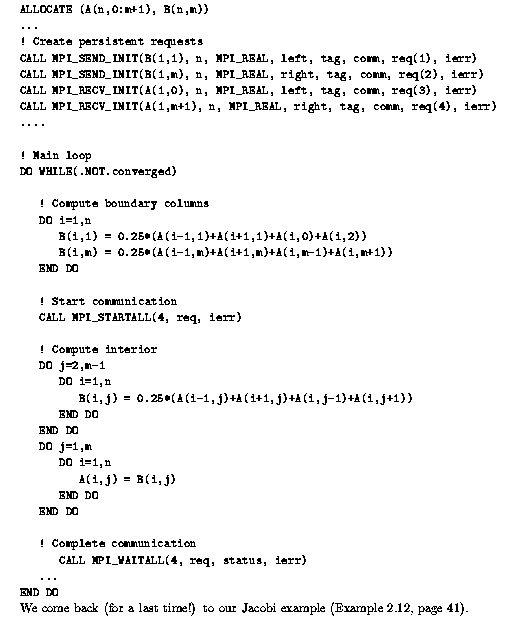persistent requestrequest, persistent porthalf-channel
Often a communication with the same argument list is repeatedly executed within the inner loop of a parallel computation. In such a situation, it may be possible to optimize the communication by binding the list of communication arguments to a persistent communication request once and then, repeatedly, using the request to initiate and complete messages. A persistent request can be thought of as a communication port or a ``half-channel.'' It does not provide the full functionality of a conventional channel, since there is no binding of the send port to the receive port. This construct allows reduction of the overhead for communication between the process and communication controller, but not of the overhead for communication between one communication controller and another.
It is not necessary that messages sent with a persistent request be received by a receive operation using a persistent request, or vice-versa. Persistent communication requests are associated with nonblocking send and receive operations.
A persistent communication request is created using the following functions. They involve no communication and thus have local completion semantics.
MPI_SEND_INIT(buf, count, datatype, dest, tag, comm, request)
IN buf initial address of send buffer
IN count number of entries to send
IN datatype datatype of each entry
IN dest rank of destination
IN tag message tag
IN comm communicator
OUT request request handle
MPI_Send_init(void* buf, int count, MPI_Datatype datatype, int dest, int tag, MPI_Comm comm, MPI_Request *request)
MPI_SEND_INIT(BUF, COUNT, DATATYPE, DEST, TAG, COMM, REQUEST, IERROR)<type> BUF(*)
INTEGER REQUEST, COUNT, DATATYPE, DEST, TAG, COMM, REQUEST, IERROR
MPI_SEND_INIT creates a persistent communication request for a standard-mode, nonblocking send operation, and binds to it all the arguments of a send operation.
MPI_RECV_INIT(buf, count, datatype, source, tag, comm, request)
OUT buf initial address of send buffer
IN count number of entries to recv
IN datatype datatype of each entry
IN source rank of source
IN tag message tag
IN comm communicator
OUT request request handle
MPI_Recv_init(void* buf, int count, MPI_Datatype datatype, int source, int tag, MPI_Comm comm, MPI_Request *request)
MPI_RECV_INIT(BUF, COUNT, DATATYPE, SOURCE, TAG, COMM, REQUEST, IERROR)<type> BUF(*)
INTEGER COUNT, DATATYPE, SOURCE, TAG, COMM, REQUEST, IERROR
MPI_RECV_INIT creates a persistent communication request for a nonblocking receive operation. The argument buf is marked as OUT because the application gives permission to write on the receive buffer.
Persistent communication requests are created by the preceding functions, but they are, so far, inactive. They are activated, and the associated communication operations started, by MPI_START or MPI_STARTALL.
MPI_START(request)
INOUT request request handle
MPI_Start(MPI_Request *request)
MPI_START(REQUEST, IERROR)INTEGER REQUEST, IERROR
MPI_START activates request and initiates the associated communication. Since all persistent requests are associated with nonblocking communications, MPI_START has local completion semantics. The semantics of communications done with persistent requests are identical to the corresponding operations without persistent requests. That is, a call to MPI_START with a request created by MPI_SEND_INIT starts a communication in the same manner as a call to MPI_ISEND; a call to MPI_START with a request created by MPI_RECV_INIT starts a communication in the same manner as a call to MPI_IRECV.
A send operation initiated with MPI_START can be matched with any receive operation (including MPI_PROBE) and a receive operation initiated with MPI_START can receive messages generated by any send operation.
MPI_STARTALL(count, array_of_requests)
IN count list length
INOUT array_of_requests array of request handle
MPI_Startall(int count, MPI_Request *array_of_requests)
MPI_STARTALL(COUNT, ARRAY_OF_REQUESTS, IERROR)INTEGER COUNT, ARRAY_OF_REQUESTS(*), IERROR
MPI_STARTALL starts all communications associated with persistent requests in array_of_requests. A call to MPI_STARTALL(count, array_of_requests) has the same effect as calls to MPI_START(array_of_requests[i]), executed for i=0 ,..., count-1, in some arbitrary order.
A communication started with a call to MPI_START or
MPI_STARTALL is
completed by a call to MPI_WAIT, MPI_TEST, or
one of the other completion functions described in
Section ![]() . The persistent request becomes inactive after
the completion of such a call, but it is not deallocated
and it can be re-activated by another MPI_START or
MPI_STARTALL.
. The persistent request becomes inactive after
the completion of such a call, but it is not deallocated
and it can be re-activated by another MPI_START or
MPI_STARTALL.
Persistent requests are explicitly deallocated by a call to
MPI_REQUEST_FREE (Section ![]() ).
The call to MPI_REQUEST_FREE can occur at any point in the program
after the persistent request was created. However, the request will be
deallocated only after it becomes inactive.
Active receive requests should not be freed. Otherwise, it will not be
possible to check that the receive has completed.
It is preferable to free requests when they are inactive. If this
rule is followed, then the functions
described in this section will be invoked
in a sequence of the form,
).
The call to MPI_REQUEST_FREE can occur at any point in the program
after the persistent request was created. However, the request will be
deallocated only after it becomes inactive.
Active receive requests should not be freed. Otherwise, it will not be
possible to check that the receive has completed.
It is preferable to free requests when they are inactive. If this
rule is followed, then the functions
described in this section will be invoked
in a sequence of the form,
Create (Start Complete)* Freewhere * indicates zero or more repetitions. If the same communication request is used in several concurrent threads, it is the user's responsibility to coordinate calls so that the correct sequence is obeyed.
MPI_CANCEL can be used to cancel a communication that uses a persistent request, in the same way it is used for nonpersistent requests. A successful cancelation cancels the active communication, but does not deallocate the request. After the call to MPI_CANCEL and the subsequent call to MPI_WAIT or MPI_TEST (or other completion function), the request becomes inactive and can be activated for a new communication.

